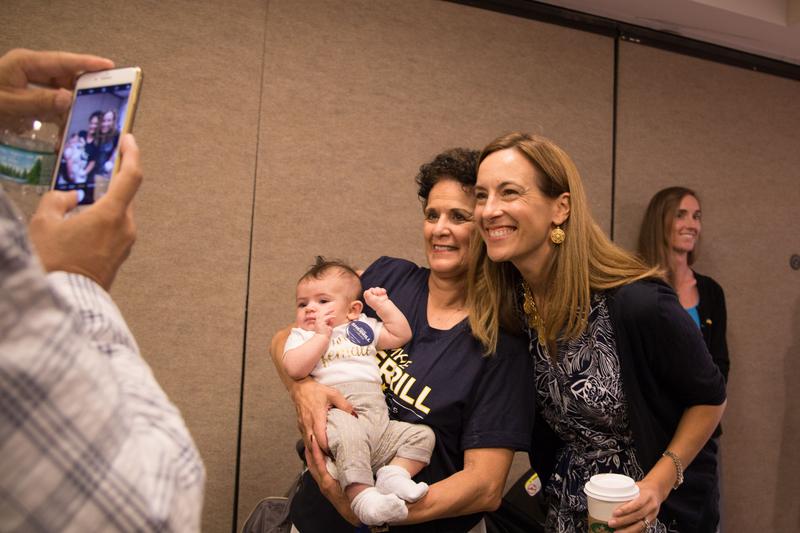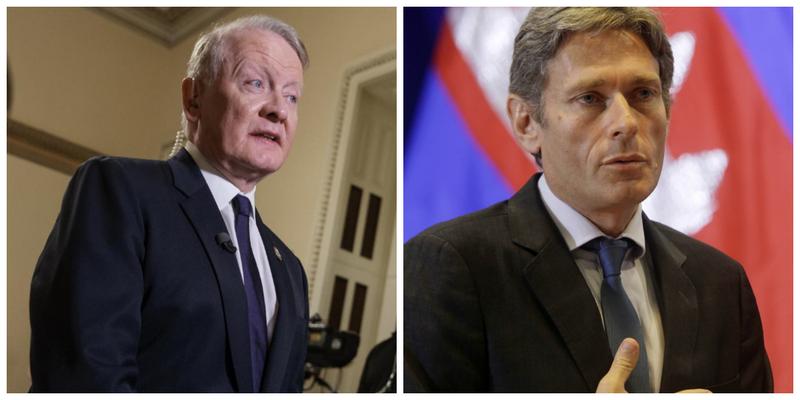
Forced separation of immigrant families. The door slammed on tens of thousands of refugees. Immigration and Customs Enforcement agents looking for immigrants at courthouses, and soldiers looking for immigrants at the border. President Trump's immigration policies are so divisive they seem ripe for political exploitation by Democrats running tight races in swing districts. But in New Jersey, most of the time you hear congressional candidates mention immigration, they're Republicans.
In the 11th district, Democrat Mikie Sherrill doesn't list "immigration" as one of the 12 issues on her website. She hasn't tweeted about immigration since June. She blew off a chance to debate her opponent on immigration, and her spokesperson didn't respond to an email seeking her immigration platform.
The reason may be the Democratic party perspective on how Sherrill can win a seat long held by a Republican in a mostly white, suburban district that narrowly voted for Trump. While child separation may be upsetting to Democrats, it is not a motivating factor for these voters. On the other side, however, the approaching caravan of immigrant adults and children from Latin America does motivate Republicans to the polls.
As Steve Doocy, host of Trump's favorite morning show, "Fox & Friends," put it: "If you think our southern border should be open, support the Democrat. If you think the southern border should be a border with processing people and stopping them accordingly, then you should vote for Republicans."
As a case in point, Fox is promoting the candidacy of Republican Jay Webber, Sherrill's opponent, and Webber used an appearance on Fox & Friends Saturday to warn of the danger of the caravan. He also tweeted about the "looming disaster" of the immigrants approaching the border, and held a press conference with a former ICE agent.
"Mikie's run with people who want sanctuary cities and sanctuary states, like [Gov.] Phil Murphy, like [Rep.] Nancy Pelosi," Webber said at a recent debate. "Mikie runs with people who want open borders, and want to abolish ICE. She doesn't say anything about the issue unless she's pressed in a debate forum like this."
In that debate, Sherrill did not return fire and try to link Webber to Trump, whom Webber supports, nor to the policy of family separation. Instead, she played defense. "Well I don't want to abolish ICE. I never wanted to abolish ICE," she said. "I attended a rally that was to address border separations, and some people showed up with some signs."
She said she opposed the proposed wall on the southern border, but added that more tax dollars should be allocated for border security, like drones. "People in the district tell me...'You know it might be we don't need a wall between the United States and Mexico, we need a tunnel into Manhattan,' and that's where I think the focus in Washington should be," she said.
Her approach was right out of a memo from two Democratic think tanks that was obtained by The New York Times. It said Democrats should spend "as little time as possible" talking about immigration in this election, and instead reframe the debate over kitchen table issues.
"I think it feels almost like a betrayal," said Nedia Morsey, an organizer with Make The Road Action, an immigrant advocacy group. Morsey thought all of the high-profile activism of the past two years -- huge airport protests against the Muslim Ban, for example, and broad public support for Dreamers -- had activated the base, forcing pro-immigrant issues to the forefront of Democratic campaigns.
In the least, Morsey expected a mention on candidates' websites.
Democrats "are going to have to be held accountable," she said. "It's a movement moment that allows them to have this platform that they stand on now, and they should be held accountable to the folks that helped create that space."
Sixty-seven percent of Latinos throughout the country say Trump's policies are harmful to Hispanics, according to the Pew Research Center, and a majority worry about deportation (of themselves or loved ones). But they also largely believe both parties share blame for the incomprehensible mess of an immigration system.
Immigration concerns also might not rise to candidates' attention in these districts because they do not view Latino voters as an electoral force. Trump's racist sentiments have yet to translate into numbers at the ballot box -- a smaller percentage of Latinos voted in 2016 than in 2012.
Therefore, Democratic operatives advise candidates, stick to issues that target centrists and moderate Republicans, like health care.
Down in the 3rd district, Democrat Andy Kim steadfastly refused to respond to a Republican tracker's repeated questions about whether he wants to abolish ICE (he later said he doesn't). Kim's other views on immigration are unclear. A spokesperson didn't reply to an email asking for the candidate's platform.
That has created the space for his Republican opponent, Rep. Tom MacArthur, to carve out a moderate position. MacArthur wants a "fix" for the Dreamers brought to the country as kids, and he opposes Trump's plan to end birthright citizenship. He also gave a muted response about the caravan traveling to the border.
Two Democrats challenging incumbent Republicans have been more vocal than the rest. But they focus less on the policy differences, and more about how the incumbents have lacked leadership on these matters.
In the 4th district, Democratic challenger Josh Welle traveled to the border over the summer with other congressional candidates to meet with immigrants and ICE agents. He wants a pathway to citizenship for the 11 million undocumented immigrants, with a priority for Dreamers. And in a debate he briefly criticized his opponent, GOP Rep. Chris Smith, for not pushing back on Trump's controversial family separation policy, which he calls a human rights violation.
Over in the 7th district Democrat Tom Malinowski, an immigrant himself, slammed Congress for taking "zero action" to stop the "cruel, heartless and unlawful policy of kidnapping parents at the border." Malinowski also opposes the wall on the southern border and the ban on travelers from mostly Muslim countries. But his opponent, Republican Rep. Leonard Lance, who in 2016 wanted more restrictions on refugees from Syria and Iraq, has staked out more moderate positions: He opposes Trump's wall on the southern border, and supports Dreamers.
In that way Lance has essentially neutralized the most controversial issue in America. That frustrates Karol Ruiz, co-president of Wind of the Spirit, an immigrant rights group, who says Democrats have failed to distinguish themselves.
For example, she said, Malinowski and Lance both prioritize the need for more border security, which indicates they "misunderstand the issue," Ruiz said. She noted that most undocumented people in the country didn't sneak across the border -- they overstayed their visas. ”So Tom Malinowski has a long way to go for me to feel that he gets it on immigration," she said.
Ruiz is Lance's constituent, but she's also tracking Sherrill, the Democrat running in the 11th district. In contrast to Sherrill, Ruiz said, "at least he put immigration on his platform on his website for all to see."
"You're never going to please everybody, and I think Mikie Sherrill is trying to please everybody and trying to win -- as well she should," Ruiz said. "We're talking about children, we’re talking about families, and she's playing it safe. And we'll see on Nov. 7th how that works out and after that whether she pivots to a more family friendly, immigrant friendly position. Or whether she maintains a harder law enforcement line."
Sherrill did receive the endorsement of the Latino Action Network, particularly because of her support for criminal justice reform. "We're not a single issue organization, we look at the entirety of a candidate," said Christian Estevez, the group's president.
One Sherrill supporter, Rose Oosting of Montclair, said she understands that Sherrill needs to be "politically cagey."
"However in general I think it represents a problem on the part of Democrats who are unable to take a stance on a number of issues, including immigration, because they’re afraid that they’ll lose votes," she said. "And I think that costs them the leadership of the country, because I think they need to take a moral stance to lead people in a moral direction."

